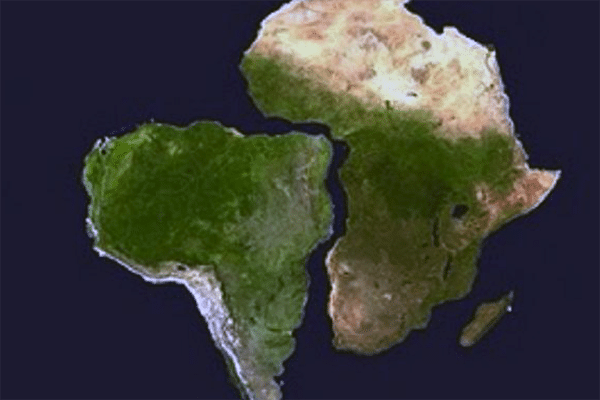The African continent, like the American continent, was subjected to colonization and intervention by European nations and, although the processes were different, there are common channels between the two histories, just as there are with Asia.
One such conduit is the slave trade that took place from Africa to America between the 16th and late 19th centuries. Another is the current international division of labor, that global order in which the European metropolises imposed on both continents the role of being extractive enclaves, no matter what economic model was involved.
INCOMPLETE INDEPENDENCE AND THE PRISM OF RACIAL SUPERIORITY
Since the end of the 19th century, European development has been based much more on the plundering of African lands and the buying and selling of its people. In addition, many African men enlisted to fight in the wars of their colonizers: thousands of soldiers from that continent participated in both “world” wars.After this confrontation in the Global North the effect was imminent. An anti-colonial wave swept across Africa, to which France, Britain, Belgium and Portugal, as well as other imperial powers, responded according to their political and economic circumstances. All faced nationalist resistance, none agreed without internal pressure to grant independence to their colonies. Most anti-colonial movements used non-violent tactics, although France and Britain responded with repression, which degenerated into armed struggles for national independence during the 1950s and 1960s.
Armed uprisings in Madagascar, Algeria and Cameroon were brutally suppressed by the French, and Britain employed draconian methods to put down the Mau Mau insurgency in Kenya by massacring the civilian population living in rebel-held areas.
Both powers eventually acceded to African demands for independence, relying on their ability to transfer political power to African governments willing to protect their economic and political interests. Meanwhile, Belgium and Portugal opted to protect their interests by military means through long wars to resist decolonization in the case of Portugal, or to intervene in a bloody manner as Belgium did in the already independent Congo.
The presence of white settlers changed the dynamics of all the struggles for independence in French Algeria, Portuguese Angola and Mozambique, British Rhodesia (present-day Zimbabwe), Afrikaner-dominated South Africa and Namibia, leading to protracted wars of national liberation involving Cold War factors: the United States, China, Cuba and the Soviet Union.
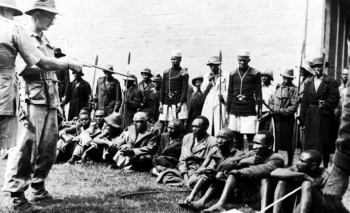
The creation of powerful settler regimes in Africa served to support the dominance of Western capitalism (Photo: Archive).
In particular, the presence of the United States in the political processes in Africa intensified in the 1970s. From the Western establishment led by Washington, the momentum gained by African nationalist movements was viewed with suspicion and was targeted for extermination by the CIA, Lumumba case, considering that they were the product of “external communist subversion”. Africa was seen through the prism of white minority rights and the Cold War.
This translated into a new form of intervention during that decade: coups d’état. Last March, U.S. General Michael Langley, head of the U.S. Africa Command (Aricom), admitted before the Armed Services Committee of the U.S. House of Representatives that about 1% of the military personnel trained by the U.S. Armed Forces had participated in the overthrow of political leaders in Africa.
A systematic rinvestigation published in 2003 revealed that, between 1956 and 2001, 188 coups d’état took place in Africa, which, added to the 44 that have taken place since then until 2021, give a total of 232, at a rate of 3.5 per year in the whole continent.
For its part, during the Cold War the USSR was interested in the decolonization of the “Third World” because it offered the possibility of new alliances in the struggle against Western imperialism. From Moscow it was argued that the backwardness of the emerging nations was the result of capitalist exploitation and it was considered that the elimination of colonial capitalism was necessary for their advance, so that the triumph of national liberation over imperialism was a precondition for integration and for the victory of socialism over capitalism.
THE SCRAMBLE FOR AFRICA, BETWEEN INTERVENTION AND CONTROL
The stalking of African governments stems from foreign corporate interests managed by the old and new colonial configuration. The notion of “backyard” promoted by the Global North extends to this continent, accentuating the neglect, which has widened the conditions that generate global poverty and marginalization, in addition to multifactorial mechanisms of political and economic extortion.
It is becoming increasingly evident that this arrangement of borders is being used today by the West to impose the shock doctrine: The United States and its satellites have taken advantage of the inter-ethnic boiling to increase their influence and control in Africa, as well as to deconfigure any initiative or government seeking a voice of its own from the continent, as was the case with Gaddaffi. Not only the vulgar assassination of this leader and the consequent destruction of Libya, but also the provision-at times-of weapons and logistics to extremist groups such as Boko Haram, the “training” of military personnel in the service of regime change, the establishment of soft power mechanisms via NGO s to control agri-food systems, and other figures of “cooperation” with which the interests of emerging global powers such as China, India, Russia and South Africa itself are disturbed.
Particularly the efforts of this country to take on peace initiatives as has occurred in Libya and recently in Ukraine. Journalist Nick Turse investigated the seemingly silent manner in which the U.S. Africa Command (Africom) has intervened on the continent.Its operational expansion has grown in tandem with terrorism and it does not seem coincidental. This military arm was created, according to its first commander, General William Ward, to “be a different kind of command”: less hard-nosed, more peace corps.”Africom focuses on preventing wars,” said Deputy Assistant Secretary of Defense for African Affairs Theresa Whelan, in 2007,
rather than fighting war.
Between 2013 and 2017, however, U.S. commandos engaged in combat in at least 13 African countries—Burkina Faso, Cameroon, Central African Republic, Chad, Democratic Republic of Congo, Kenya, Libya, Mali, Mauritania, Niger, Somalia, South Sudan and Tunisia.
In the wake of a 2017 ambush by ISIS militants on U.S. troops in Niger that killed four military personnel, Republican Senator Lindsey Graham, then a member of the Senate Armed Services Committee, said,
We don’t know exactly where we are in the world, militarily, and what we’re doing.
That decade the United States had carried out at least 36 operations and activities mentioned above in Africa, more than anywhere else in the world, including the Middle East. The UN denounced in 2022 that the Lake Chad basin, which borders the country of the same name, Nigeria, Niger and Cameroon, is the largest area of operations of ISIS, while the Sahel areas are “ungovernable” and Somalia remains the “epicenter” of the Islamic State in the Horn of Africa.
Although repeatedly denied by Pentagon officials, Turse unveiled data on a network of military bases in Africa including drone bases in Niger, Cameroon and the Horn of Africa.Also a secret network of National Security Agency (NSA) spying posts in Ethiopia and Mali.
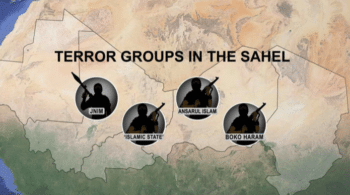
The expansion of the United States Command for Africa has “coincided” with the increase of extremist groups in the G5 Sahel ( Photo: Islam Media Analysis )
It is classic for the West to maintain chaos in regions where geostrategic dispute is crucial. In the Sahel G5, which includes Burkina Faso, Chad, Mali, Mali, Mauritania and Niger, China has geopolitical interests and Russia has deployed security cooperation programs: Niger has between 5% and 7% of the world’s highest grade uranium and the world’s fifth largest reserves. Mali has 4 million tons of lithium and 1.63 tons of bauxite as of 2017—which translates to 572 tons of aluminum—, 2 million tons of iron ore, 800 tons of gold, manganese and 10 million tons of limestone. Chad has water, a particularly valuable asset in that part of the world. Burkina Faso and Chad had beatings in the past two years, Mali had two, Niger had a “failed” attempt in 2021.
THE BURDEN OF DEBT AND FINANCIAL TUTELAGE
In a large part of Africa there are States that are internationally recognized as sovereign but remain quite dependent on the colonial metropolises. The mechanisms of domination are diverse, but the economic ones are perhaps the most visible, along with the cultural ones. They range from the indigenous ruling strata, many of them objective allies of transnational capital, although there are very dynamic internal frictions; to servile relations mediated by the more than 450 billion dollars of debt owed by the continent the continent to entities such as the International Monetary Fund and the World Bank.
They currently devote between 15% and 30% of their meager budgets to paying the high interest on their foreign debt, even when international organizations and some countries announce reductions and deferrals. None of the ten most indebted countries on the planet belong to the African continent, but they are still the ones that face the greatest problems in meeting their payments, said former Tanzanian President Julius Nyerere: “Should we really let our people starve to death in order to pay our debts?
The oldest experience of a monetary unit on the continent is the CFA franc, a currency used by 14 African countries, most of them with a French colonial past (or franc zone). Also called “Francafrica”, the currency was created at the end of the Second World War to “facilitate the drainage of resources from these conquered territories to the metropolis and, at the same time, to ensure the economic control of these colonies”, according to journalist Fanny Pigeaud, who published the book The Invisible Weapon of Francafrica: a history of the CFA franc together with Senegalese economist Ndongo Samba Sylla.
Its value is linked to that of the currency used in France, currently the euro, and there are two versions: the one issued by the Central Bank of West African States (BCEAO) and the Bank of Central African States (BEAC).Although they are worth the same, they are not interchangeable. France is represented in both bodies, which is why Sylla and Pigeaud claim that this currency served the European power to officially recognize the sovereignty of its former colonies without letting go of the reins of their economies.
Both banks are obliged to deposit 50% of their international reserves in a “special account” of the French Treasury, which in return guarantees the convertibility of CFA francs to euros.
Although it offers them “monetary stability”, each country, obviously poor, must fix the value of its currency according to the Eurozone. Moreover, although it offers them greater FDI, France itself does not invest in the countries of the “franc zone”, which receive only 3.7% of the French FDI in Africa.
THE HARD TRANSITION TO UNION
Transcending from mere integration to solid union is the transit of many regions of the Global South, it happens to Africa, it happens to Latin America. One of the factors that has impacted this process in Africa is the diversity of its leadership, which has an impact not only for ethno-cultural reasons but also for the different paths from which characters have emerged that have forged a political identity in the continent.
Although it has been pejoratively denoted by Western propaganda, Third Worldism as a notion set the tone for the leaders of different countries in the context of the recomposition of the second post-war period and the debates on the development of the different regions of the world.
The concept, coined in 1952 by French demographer and economist Alfred Sauvy, was used to describe the abysmal social inequalities on a planetary scale. In his book The Darker Nations: A People’s History of the Third World, Vijay Prashad affirms that it was “not a place,” a more or less delimitable geographic space, but “a project.”
The spectrum of African leaders has ranged from nationalists such as Julius Nyerere (Tanzania), Kwame Nkrumah (Ghana), Patrice Lumumba (Congo), Modibo Keita (Mali), Gamal Abdel Nasser (Egypt) or Ahmed Sekou Touré (Guinea); to military leaders such as Thomas Sankara (Burkina Faso) or Muammar Gaddafi (Libya); to activists such as Nelson Mandela (South Africa). From this diversity have emerged the forces to set the union on track, not without wounds, contradictions and wars in which the West has almost always been the hand that detonates the facts. The non-alignment advocated by many of these leaders has translated into less support for Western hegemony and more support for the regional cause.
In a webinar organized by United World International under the title of “Africa and Multilateralism,” with the participation of journalists and experts from various countries, Algeria-based North Africa expert Doğan Duyar said:
African development takes place in cycles of approximately 60 years. The continent fought 60 years for political independence from the colonial powers, achieved in the 1960s. Then followed another wave, which also lasted 60 years, when the old colonial powers and the new ones, France and the United States, have established neo-colonial rule over the continent.Today, the third wave has begun, when emerging powers such as China, Russia and Turkey support a new trend of independence on the continent.
His words summarize the future and the present of a continent of more than 30 million square kilometers and 1.32 billion inhabitants.Perhaps the most eloquent space of what has been called the “fourth African struggle” is the AU.This space took a vital step during the 30th Session of the Assembly of Heads of State and Government of the Organization of African Unity (OAU, founded in May 1963), held in Tunis in June 1994.
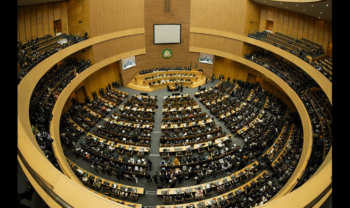
The African Union (AU) has become a pole in the emerging multipolar world (Photo: Archive)
Since then, the formation of regional entities with greater political and economic ties has been promoted, which have been driven by “the need not only for political independence and improved living standards, but also for liberation from economic dependence and democratic stagnation, which had prevented prosperity in the short independent life of the continent,” according to Guinean intellectual Carlos Lopes.
The AU has given strength to a geopolitical identity in which the various steps and achievements have highlighted a role beyond the ethnocentric monologue of the West. Its Constitutive Act was adopted in July 2000 during the Lomé (Togo) Summit and signed by 53 African Heads of State, but entered into force at the Lusaka (Zambia) Summit in July 2001, after the 36th signatory State ratified it, thus reaching the required two-thirds. The important geopolitical pole of continental unity was officially inaugurated at the Durban Summit in South Africa in July 2002.In 20 years it has had achievements such as:
- Significant policies on peace, security and trade through initiatives such as the African Continental Free Trade Area (AfCFTA). This is the largest free trade area in the world in terms of the number of participating countries.
- The AU Commission, which represents the AU in the various multilateral forums, sets the agenda and represents African interests in global forums alongside the United Nations (UN) and the European Union (EU).
- So far in the 20th century, African economies, which weathered the global financial crisis of 2008 and 2009, have achieved GDP growth rates of close to 4%.
- Constitution in process of the African Central Bank (ACB), one of the three financial institutions of the AU which, together with the BEAC and the BCEAO, will progressively acquire responsibilities from the African Monetary Fund. It seeks to promote a more active participation of States in regional trade by offering financial support to manage the associated risks through greater social integration and extensive interregional trade.
FACTS AND FIGURES
-
- The path of Pan-Africanism promoted by the former president of Ghana Kwame Nkrumah (1960-1966), among others, has had setbacks, however, some voices have been disassociated from a certain stagnation induced from the North:
- In 2019, during the Assembly of the African Union, the political bloc of 55 states expressed its support for President Nicolás Maduro, as the legitimate elected president. In addition, in Mali, Tunisia and Namibia, demonstrations in favor of Venezuela in the face of external aggression were recorded.
- In February 2022, during a UN session in which a vote was taken to condemn Russia’s special military operation in Ukraine, there were 35 abstentions, 15 of them were from African countries, while 16 others out of 40 opposed the motion.
- Last February the summit was held in Addis Ababa, Ethiopia, and reviewed the status of Israel as an AU observer member and the Palestinian cause.
- At this, the 36th summit, fully supported the Palestinian people in their struggle to resist Israeli occupation. They also affirmed their support for Palestinian membership in the UN.
- Last March the president of Namibia (a former German colony), Hage Geingob, gave a blunt reply to the German ambassador, Herbert Beck, when the latter reproached him for the presence of Chinese nationals in the country he leads. The answer was:
What is your problem with that, why is that a problem now? Europe considers it a problem, but it is not a problem for us.
La contundente respuesta del Presidente de Namibia al embajador de Alemania que le recrimina la presencia de ciudadanos chinos en su paíshttps://t.co/Q4Ub6OKvlW pic.twitter.com/7hyFSWcdu3
— Annur Tv (@annurtv) March 6, 2023
-
- Also last March, the President of the Democratic Republic of Congo, Felix Tshisekedi, reproached his French counterpart, Emmanuel Macron, for Paris’ stance towards the African country. During a joint press conference Tshisekedi said:
Look at us differently, respecting us, considering us as true partners and not always with a paternalistic look, with the idea of always knowing what we need.
- During a speech in the Djibouti Parliament, Kenyan President William Ruto questioned the need to involve the U.S. dollar in commercial activities and stressed the need to abandon dependence on that currency. In doing so, he called for the use of African national currencies to facilitate trade within the continent.
The exhaustion of the tutelary relationship imposed by the West has caused a continent with such politically and ideologically disparate leaderships to take positions in its own direction based on interests centered on the African reality.
MULTIPOLARITY IN DATA
- Some data that show how multipolarity is shaping up in Africa:
- The Chinese Loans to Africa Database, a Johns Hopkins University database, estimates that Chinese financiers signed 1,188 loan commitments worth $160 billion to African governments and their state-owned enterprises between 2000 and 2020.
- Brazil’s bilateral trade with Africa in 2022 was one third lower than in 2013, when the flow reached almost 30 billion dollars, however it increased from 2 billion to 10 billion between 2000 and 2010 and the current Lula government has proposed integrating the AU as a member of the G20.
- According to the IMF Africa accounted epresented for 15% of India’s total outward investment between 2017 and 2019. FDI flows from the Asian subcontinent are concentrated in the services sector, which accounts for almost 75% of the total.In the closing speech of the Celac,
- Chinese President Xi Jinping invited the 33 Latin American nations to be part of the New Eurasia-Africa-Americas Silk Roads.
- Eight of the 26 countries that have expressed their intention to join the Brics are African -Algeria, Egypt, Ethiopia, Nigeria, Senegal, Sudan, Tunisia and Zimbabwe.
- The most recent was Ethiopia,, which submitted its formal application to join the group of emerging economies on June 29.
- Growth companies in Kenya raised more than $1 billion in the first half of 2022, an increase of 422% over the previous year.
- These companies, along with those in Nigeria, Egypt and South Africa, together raised 92% of all high-tech investment.
- Last June a delegation of African leaders led by South African President Cyril Ramaphosa and Senegalese President Macky Sall visited Ukraine and Russia to try to mediate an end to the war that broke out in February 2022.
- The initiative was suspiciously made invisible by the Polish government, which for 24 hours prevented the disembarkation in Warsaw of South African journalists and 120 security agents mobilized by Ramaphosa for the mission.
WHAT ABOUT LATIN AMERICA?
Latin America has regional organizations that have allowed it to move towards unity; in fact, the inspiration has been embodied in various initiatives that have been systematically sabotaged by the United States. Both the United States and the EU have realized the need to recover ground lost after the crisis in the global economy, which has diminished their influence and their capacity to direct the economic destinies of the region.Even if it aims at a more functional integration than the current one, the region still has a long way to go to form blocs in which the weakness of intra-regional economic interdependencies can be overcome and a regional front with its own voice in global processes and events can be formed.One example is the fact that while the AU is seeking a permanent seat for Africa on the UN Security Council, the Latin American region does not aspire to this as a bloc, but rather the larger countries with larger economies such as Brazil, Argentina and Mexico are trying to take the step with the support of the rest of the region and others.
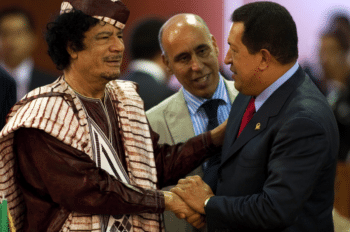
For Hugo Chavez, South-South cooperation was vital for Africa and Latin America to form a pole of power (Photo: NBC).
There are initiatives that have projected progress towards multipolarity, such as proposals for common currencies, intraregional free trade areas, exchanges on different issues, adaptation to climate change and others; but they remain timid in the face of what is missing in terms of unity and independence.
There are many common factors with Africa: one is the debt, another is the importance of the export of raw materials in the economic systems, the young labor force and, the most important, the possession of natural resources. However, issues such as food and technological sovereignty and self-determination in the political directions that each people decides to take are still pending.
Although strategies continue to be generated from the North to infiltrate the search for a continental identity, such as the Young African Leaders Initiative (Yali), the different expressions of organization in the regions are gaining strength. Regarding Yali, journalist Pepe Escobar has described it as a mechanism equivalent to Africom applied in 49 African countries, focused on “training young people” in business until they are prepared for a “long-term commitment between the United States and Africa”. All paid for by U.S. universities, Coca-Cola, IBM, MasterCard Foundation, Microsoft, Intel, McKinsey, General Electric and Procter & Gamble, thirsty for cheap water, labor and strategic minerals.
In February 2013 Commander Hugo Chávez issued an international statement in the framework of the South America-Africa summit ( ASA ), held in Malabo ( Equatorial Guinea ). In the message sent, he reiterated that “we are the same people” and insisted on union as a means for South-South cooperation. Chávez called to unify the capacities of the continents, where the natural, political and historical resources required to save the planet from the chaos to which it has been led are found, “in a real pole of power”.
Almost everything that has constituted backwardness and abandonment for the mother continent has served for their countries to assume unitary positions without renouncing diversity, have been able to transcend border imposition by establishing regional ties, they have survived the Cold War and the current global confrontation with political and economic initiatives that give them a place of weight in the multipolarity that is looming, all this in the midst of contradictions and surviving a capitalism that, being in decline, becomes increasingly voracious.
The communicating vessels are half full for some regional aspects, others are half empty, but what is missing for the union is in what the emerging dynamics that involve new centers and poles of power and sovereignty demand.
Translation by Internationalist 360°

